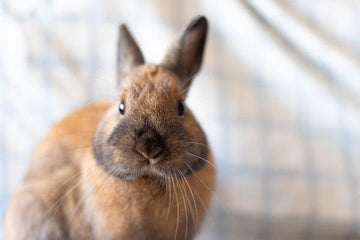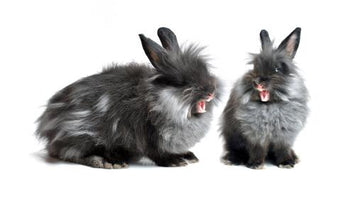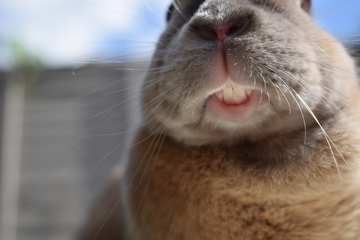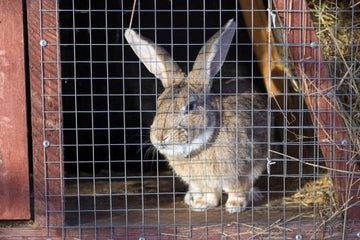Guinea pigs pros and cons: Weighing the options
It's hard not to fall for the sweet face of a guinea pig. With their squeaky voices, twitching noses, and calm personalities, they've earned a spot in the hearts of animal lovers worldwide. These little companions can bring joy, comfort, and a surprising amount of energy into a home.
Click Here to Shop Rabbit Products.

But they're not the right pet for everyone. If you're trying to decide whether a guinea pig is the right fit for your family, understanding the perks and the challenges will help you make a thoughtful decision. Let's break down the real deal on guinea pigs pros and cons.
Why People Love Guinea Pigs
Guinea pigs, also known as cavies, have been domesticated for hundreds of years. Originally from the Andes Mountains in South America, they were first kept for food and ceremonies. Today, they're cherished pets known for their gentle nature and strong social bonds.
They don't bite often, are relatively quiet (besides the adorable squeaks), and are small enough to fit comfortably into most homes. Families with children or first-time pet owners often look to guinea pigs as an approachable option that's not as overwhelming as a dog or cat might be.
Still, for all their sweet habits, guinea pigs require daily attention and care. They're not just fluffy cage ornaments—you're signing up for a real relationship.
Pro: They're Very Social
One of the biggest upsides in the discussion about guinea pigs pros and cons is just how affectionate these animals can be. Guinea pigs are highly social creatures. They thrive on attention—not just from you, but from other guinea pigs, too.

Spend some time talking to them, offering a treat, or simply letting them explore a playpen near you. They'll chirp, purr, and popcorn (yes, that's the official term for when they jump straight up in excitement!). If you're someone who wants to build a real bond with a pet, guinea pigs will happily return that affection.
They're also generally more trusting and less skittish than other small rodents like hamsters or mice. Their personalities range from bold and curious to shy and calm. Still, with time and consistency, most guinea pigs enjoy handling and will recognize their humans.
Con: They Need Constant Interaction
Their social nature does come at a cost. Guinea pigs hate being alone. In fact, in places like Switzerland, it's considered illegal to own just one because of how much they suffer from isolation.
If you plan to keep a single guinea pig, expect to give them at least an hour or two of your attention daily. That includes talking to them, petting them, and letting them explore outside their enclosure. The better alternative is to adopt a bonded pair. They'll keep each other company and be happier overall, but that also doubles the space, food, and cleanup you'll need to manage.
Lonely guinea pigs can develop depression, stop eating, or even become ill. So, if your schedule is tight or you travel often, their high emotional needs may be a dealbreaker.
Pro: Their Diet is Simple
One of the easiest parts of guinea pig care is their diet. Guinea pigs are natural grazers and do best on a diet centered around high-quality grass hay like timothy, orchard, or meadow hay. This should be available 24/7, supporting their digestive system and dental health.
Besides hay, they'll need a measured portion of fortified pellets made specifically for guinea pigs. These should contain added vitamin C, a vital nutrient their bodies can't produce alone. Without it, they can quickly develop health issues like scurvy.
Leafy greens and fresh veggies round out their diet. Bell peppers, romaine lettuce, cilantro, and small amounts of carrots make great additions. For a more in-depth feeding guide, check out our post on what type of food to feed your guinea pig.
Con: Feeding Them Takes Some Effort
While their diet is straightforward, it isn't entirely hands-off. Guinea pigs need fresh vegetables daily, clean hay, and a constant water supply. Their hay should be replaced regularly to stay clean and fresh—especially if they've soiled it.
On top of that, guinea pigs must chew constantly to wear them down because their teeth never stop growing. That means giving them chew-safe toys or nibble sticks along with hay. Guinea pigs can develop painful overgrown teeth or abscesses that require veterinary care without proper dental wear.
They also need vitamin C every single day. You can provide this through fortified pellets and vitamin-rich produce or supplement with drops or tablets. According to experts from the Arizona Exotic Animal Hospital, daily supplementation is especially important in older guinea pigs or those with a history of deficiency.
Pro: Creating a Habitat is Easy
Setting up a guinea pig enclosure can be pretty simple—and fun to customize. These animals do well indoors, especially when the environment is stable and free from drafts or direct sunlight. If you're comfortable in a space, your guinea pig will be too.
Most pet parents start with a basic plastic-bottomed cage and build from there. You can add fleece bedding, cardboard tunnels, hay racks, and hidey-huts to make their space functional and interesting. And if you're crafty, C&C cages (cubes and coroplast) are a popular DIY option, allowing more space and flexibility.
Unlike some exotic pets, you won't need special lighting, heating elements, or complex filtration systems. Just a clean space, fresh bedding, and room to roam.
More on Guinea Pigs Pros and Cons: They Need More Space Than You Think
One of the most common mistakes new guinea pig owners make is underestimating how much space these little guys really need. Despite their small size, guinea pigs are active creatures who need plenty of room to run, popcorn, and explore.
The Humane Society recommends at least 7.5 square feet of space for one guinea pig. You're looking at a minimum of 10.5 square feet for a pair. Those tiny starter cages sold in pet stores just won't cut it—and keeping a guinea pig in a cramped space can lead to boredom, stress, and even obesity.
If you don't have room indoors, you'll need to dedicate daily floor time so they can stretch their legs safely outside the enclosure. An exercise pen or guinea pig-proofed area is perfect for this. Bonus points if you build them a cardboard maze or let them burrow into a pile of hay!
Con: Guinea Pigs Can Be Messy
If you're hoping for a super tidy pet, guinea pigs might challenge that expectation. They aren't dirty animals by nature, but their living areas can get messy quickly. Between hay, food scraps, poop pellets, and the occasional tipped-over water bottle, their enclosures require regular upkeep.
Spot-cleaning should be done daily to remove soiled bedding and old food. A complete cage cleaning—including replacing bedding and wiping surfaces—should be done at least once a week. Using fleece liners can make cleanup easier, but they'll need to be shaken out and washed regularly.
They also shed lightly and may need an occasional brushing, especially long-haired breeds like Peruvians or Silkies. If not groomed, their fur can become tangled or matted, leading to skin irritation or infection.

Pro: They Rarely Bite
Guinea pigs are known for their gentle and even-tempered nature. While some small pets can nip when scared or handled too roughly, guinea pigs rarely bite. When properly socialized and treated with care, they're much more likely to freeze or squeak than to lash out.
This makes them a good match for patient kids learning to handle animals. Still, supervision is key, especially with younger children. Guinea pigs can be startled easily, and while they won't retaliate, they might try to escape from a too-tight grip or loud noise.
Let them come to you on their terms to build trust. Offer small treats by hand and talk to them softly. Over time, they'll associate you with comfort, not stress.
Con: Vet Care Can Be Expensive
One of the less obvious items on the guinea pigs pros and cons list is vet care. While guinea pigs are generally hardy, they have unique medical needs—not all vets are trained to treat them. Exotic pet vets, specializing in small animals like guinea pigs, often charge more than traditional vets.
Common health issues include dental disease, upper respiratory infections, urinary stones, and vitamin C deficiency. Many of these can be prevented or caught early with regular monitoring, but treatment costs can add up quickly if an emergency occurs.
Before bringing home a guinea pig, check for an exotic vet in your area and ask about basic check-up fees. You might also want to set aside a small emergency fund or consider a pet insurance plan that covers exotic pets, such as those reviewed by Pawlicy Advisor.
Pro: They Can Be Entertaining and Unique
No two guinea pigs are the same. Once you spend time with them, you'll see their personalities shine in hilarious and heartwarming ways. Some are bold explorers who climb over every obstacle. Others are couch potatoes who love to nap in soft tunnels or cuddle on your lap.
Their range of vocalizations—from "wheeking" for food to "purring" when happy—makes communication a fun two-way experience. It's easy to get attached when they greet you at the cage door or chirp happily during a snack session.
Creating enrichment opportunities like obstacle courses, treat puzzles, or cozy fleece hammocks will bring out their playful side. If you're looking for a pet with a big personality in a small package, guinea pigs deliver.
Con: They're a Long-Term Commitment
Many people don't realize that guinea pigs can live quite a while—usually between 5 and 8 years, with some reaching 10. That's a long-term responsibility. During that time, they'll need daily care, regular vet visits, and plenty of social engagement.
Guinea pigs aren't the type of pet you can set up in a cage and forget about. If you're going through major life changes—like moving, heading to college, or having kids—it's worth thinking ahead. Will you still be able to provide consistent care over the next decade?
That said, for someone looking for a steady, low-drama companion who doesn't need walks or outdoor time, a guinea pig might be just right.
Where to Get Supplies for a Healthy Start
Getting the right supplies is a big part of guinea pig care. That means reliable hay, quality bedding, chew-safe toys, and food packed with essential nutrients. You can find all the basics (and some fun extras) at Rabbit Hole Hay's online store. They even ship fresh hay directly to your door, so you don't have to worry about running out.
Final Thoughts on Guinea Pigs Pros and Cons
Guinea pigs are more than just cute faces—they're intelligent, affectionate, and charming. They make great companions for people ready to give them the attention and space they deserve. But they're also high-maintenance in ways that might surprise first-time pet owners.
By weighing the real-life guinea pigs pros and cons, you'll be better equipped to provide the care and environment they need to thrive. With the right setup and daily love, these little furballs will become a joyful part of your family.
Key Takeaways:
Guinea pigs are social animals that need daily interaction and often do best in pairs.
They require a spacious, clean environment and a diet rich in hay and vitamin C.
While low in aggression, guinea pigs need consistent care and attention over a long lifespan.

Signs of Rabbit Health: What You Should Know

Decoding Bunny Behavior: Understanding Rabbit Mood

Rabbit Grinding Teeth: What It Means










